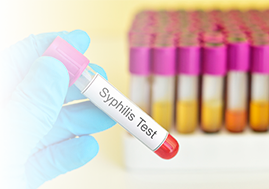What is
Syphilis?
Bicillin L-A® Shortage
The only medication available to treat pregnant people with syphilis and babies with congenital syphilis is in short supply. Healthcare providers are encouraged to prioritize Bicillin L-A® for these populations. Pfizer anticipates this shortage until early- to mid-2024. The Food and Drug Administration is now allowing the temporary importation of Extencilline (benzathine benzylpenicillin) which is an equivalent injectable medication until supplies of Bicillin are replenished. It is only available by prescription in the United States.
Syphilis is caused by a bacterium (Treponema pallidum) and spreads through direct contact with syphilis sores during sex and in general. Syphilis is a sexually transmitted infection. Syphilis sores can appear in the mouth and on the tongue and syphilis can be spread through oral sex. These sores can also occur on the penis, in the vagina and in and around the anus. They can be hard to see.
Syphilis cases are on the rise in suburban Cook County (SCC) and other areas in our region.
Syphilis in suburban Cook County
In the past ten years, primary and secondary syphilis cases have more than doubled, from 91 in 2011 to 277 in 2021. From 2019 to 2021, primary and secondary syphilis cases increased 60%. We don’t know all of the reasons for this increase. One reason may be smartphone ‘hookup apps’ have made it easier for people to locate one another for sex. Having sex with a partner you don’t know well can be risky.
Who is Most At Risk For Syphilis
%
40%
40% of syphilis cases are ages 20-29 years old
%
25%
25% of primary and secondary syphilis cases are ages 20-24 years old
%
90%
90% of primary and secondary syphilis cases in suburban Cook County are male
%
57%
57% are non-Hispanic Black
%
22%
22% are non-Hispanic White
%
16%
16% are Hispanic/Latino
What sexually active people can do to prevent syphilis
To reduce the number of syphilis cases, we all need to work together: Health departments, health care providers, and everyone who is sexually active.
Get Tested
Anyone at increased risk should be tested for syphilis. This includes individuals who are pregnant, men who have sex with men (MSM), people living with HIV, and anyone whose partner has been recently diagnosed with syphilis. Testing is also recommended for those who have new or multiple sexual partners, have a partner with unknown STI or HIV status, or use hookup apps or online platforms to meet sexual partners. Regular testing is essential to ensure early detection and treatment.


Use Condoms
If you need condoms, let us know. We will mail them to you. Use condoms the right way every time you have oral, anal or vaginal sex including hookups arranged through an app.
Talk with us
We’re here to help, not make judgments. We can also help you notify your partners or notify them if you aren’t able to. If someone from the health department is trying to contact you, chances are it’s important. Find out what they have to say. We want everyone who is sexually active to be as healthy as possible and to be infection-free – and stay that way.

Get Treated
Syphilis can be treated with antibiotics from your provider, and the earlier it’s diagnosed, the better. Untreated, syphilis can
- spread to others;
- make it more likely for you to get or spread HIV
- spread from a mother to her unborn baby and cause a miscarriage, stillbirth (a baby born dead), deformed bones, or other severe health problems
- cause other major health problems, even 30 years after the initial symptoms go away
Updated July 11, 2025, 1:38 PM
